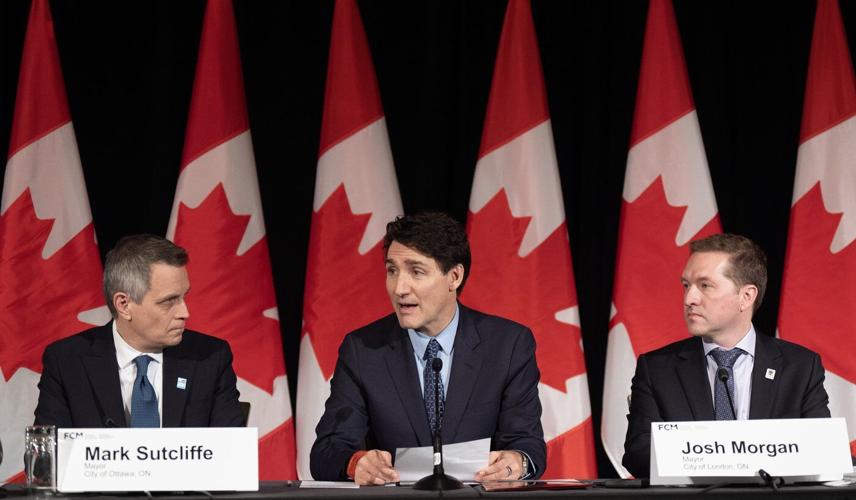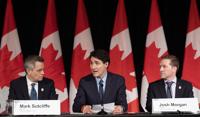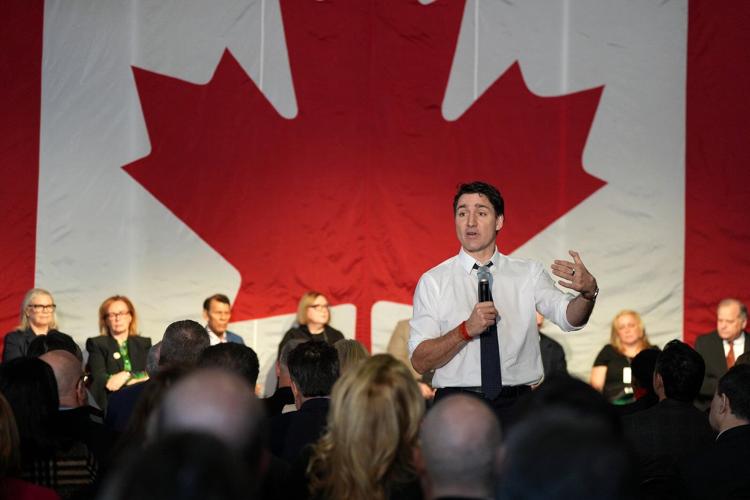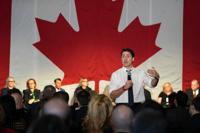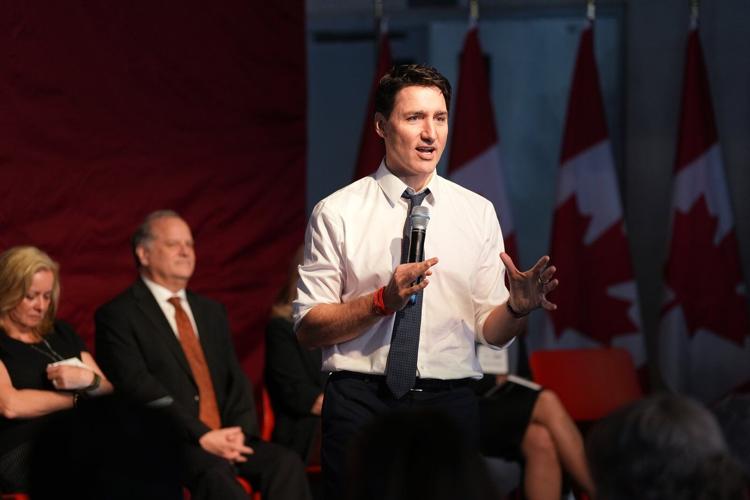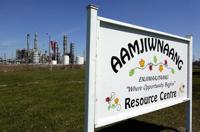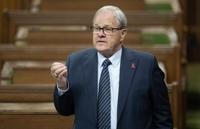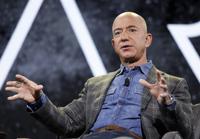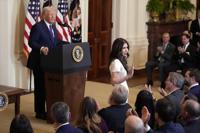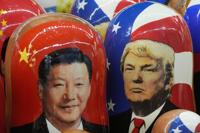Donald Trump is not joking when he says he'd like to make Canada the 51st state, Prime Minister Justin Trudeau said Friday, adding that the U.S. president's annexation plans are related to Canada's supply of critical minerals.
Trudeau made the remarks to more than 100 business, labour and industry leaders who were invited to an economic summit in Toronto hosted by the government and its advisory council on Canada-U.S. relations.
His comments about Trump were made behind closed doors after reporters were ushered out of the room. The Toronto Star was able to hear what Trudeau was saying because the audio was inadvertently broadcast.
"They’re very aware of our resources, of what we have and they very much want to be able to benefit from those," Trudeau said, as reported by the Toronto Star.
"But Mr. Trump has it in mind that one of the easiest ways of doing that is absorbing our country. And it is a real thing."
Trudeau's comments represent a marked shift in tone for his government.
Trump's statements about making Canada the 51st state first made headlines in December, shortly after Trudeau and then-public safety minister Dominic LeBlanc visited Trump's Mar-a-Lago estate a few days after Trump said he would impose tariffs on Canada the day he was inaugurated.
LeBlanc, who has since become the finance minister, initially told reporters it was clear Trump was joking and suggested that was a sign the relationship was going well.
But Trump hasn't stopped openly musing about taking over Canada. He has said he would use "economic force" to make it happen and has repeatedly told reporters Canada can avoid sweeping tariffs if it becomes a state.
Transport Minister Anita Anand, Industry Minister François-Philippe Champagne and Labour Minister Steven MacKinnon were asked about Trudeau's comments in Toronto on Friday.
Anand said it's clear that everyone at the summit agreed on one thing. "And that is, there will be no messing with the 49th parallel," she said.
"Canada is free. Canada is sovereign. Canada will choose its own destiny, thank you very much," MacKinnon said.
Trump's plan to impose 25 per cent tariffs on ºÚÁϳԹÏÍø goods, with a 10 per cent tariff on ºÚÁϳԹÏÍø energy, has been put on hold until March 4.
The president said in a social media post on Feb. 3 that Canada had agreed to address his concerns about fentanyl crossing the U.S. border, and the next month would determine "whether or not a final Economic deal with Canada can be structured."
His administration also has ordered a study of the United States' trading relationship with Canada, due by April 1.
In his public comments at the summit Friday morning, Trudeau said the month-long extension on potential tariffs is something Canada "needs to use." He said there is no reason to move forward with the tariffs.
"We need to be very deliberate about how we continue to engage closely with the United States, to make the case and demonstrate that Canada is responsible for a tiny part of the North American fentanyl problem, but that we are also very bitterly touched by this tragedy," he said.
"Over the next 30 days, we will demonstrate that even the tiny amount that is Canada's responsibility into the United States is going to reduce even further."
Champagne said he's been in Washington, D.C., this week making the case against tariffs.
"One thing that I made clear is that the supply chain are very integrated, and that Canada is prepared and willing to work with our American friends on the basis of mutual respect, respecting our sovereignty, respecting the dignity of our workers and our industry," he said.
"And they understand now better than ever that you cannot pick on Canada and make life more affordable for Americans."
Beth Burke, CEO of the ºÚÁϳԹÏÍø American Business Council, said she doesn't think her fellow Americans believe Trump's threat is real or want to take over Canada.
"I think our perception is more that it is one from a position of negotiation and posturing and using it as leverage in the conversation," she said, adding that Canada and the U.S. should be "doubling down on the relationship" through things like critical minerals.
The tariff threat and the volatility of the Trump administration have many business and labour leaders in Canada urging the federal government to look for other trading partners and ways to strengthen internal trade.
Trudeau said that's part of the strategic thinking needed to make the economy resilient.
"It's about time we have genuine free trade in Canada," he said, adding that trade with the U.S. and the rest of the world is also essential.
Canada's Committee on Internal Trade met last week to tackle interprovincial trade barriers, something that was called for by premiers at a recent First Ministers' meeting.
Former Alberta premier Rachel Notley said that while it's unlikely all interprovincial trade barriers can be eliminated in under a month, there seems to be a "renewed commitment to letting go of some of the historic rationales" behind them.
"Will we get rid of everything? Don't be silly. But will we have a measurable impact on those and start making progress? I think we are well-placed to see that outcome," said Notley, a member of the advisory council on Canada-U.S. Relations.
"It is time for us in Canada to be able to work east-west with each other, rather than becoming as vulnerable as we have."
The summit brought together a wide range of people, including representatives from the Assembly of First Nations, the ºÚÁϳԹÏÍø Chamber of Commerce, ºÚÁϳԹÏÍø Manufacturers and Exporters, municipalities, the auto sector and labour groups.
Benjamin Bergen, president of the Council of ºÚÁϳԹÏÍø Innovators, said Canada needs to use this moment to be bold.
"We have to get our sh-t together and figure out (what) the world wants and sell it," he said.
This report by ºÚÁϳԹÏÍø was first published Feb. 7, 2025.

